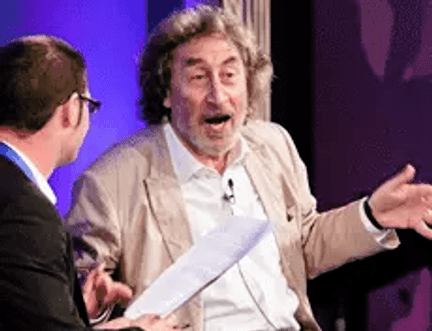More articles Saturday 25 August 2012 1:00pm
“Great book ruined by Booker” jests Howard Jacobson

Howard Jacobson, the man described by the Guardian as “one of the great sentence builders of all time” came to the Edinburgh International Book Festival today to launch his latest novel Zoo Time.
The book, which Jacobson labels “a kind of dystopian novel” set in a not-too-distant future, follows the story of Guy Ableman, a novelist not only struggling to concentrate on his writing, due to an unhealthy infatuation with his mother-in-law, but also struggling to be read. In Jacobson’s comical dystopian vision, no one reads anything anymore. Indeed, it’s not uncommon to find that one’s “publisher has just killed themselves”.
When asked why he had written a book about an undervalued and unread writer after he had won the Man Booker Prize, Jacobson replied: “I started this novel before I won the Man Booker”. After following advice he was once given by Kingsley Amis, he admitted always starting a new novel as soon as the previous one was finished: “be unfaithful to your novel as soon as you can be” he mused. Jacobson also confessed that “the signs were bad for the Finkler Question… I was over I thought, I’ll go out with a blaze, I’ll make fun of myself… Then I go and win the Man Booker Prize!” He joked that winning the Award had meant that Zoo Time became “an end of the world kind of novel, written in extremely high spirits”.
However, despite his deliciously comical prose (Jacobson described comedy as “the zest in language”), Zoo Time carries with it a sombre message: “people don’t know how to read” Jacobson sighed. “There’s a paradox” he said; when you go to literary festivals and see the crowds “you would think that everything’s as healthy as can be, but it isn’t… everyone’s writing and no one is reading.” His issue was not with the writers, he said, as it was “not a great crime” for a person to try writing and then fail to write a good book; “The unforgivable crime is the reader who does not know that the book isn’t any good.” One of his biggest bugbears being those people who dislike literature because they don’t “identify” or “sympathise” with the main character: “who ever told anyone that they should read a book to find themselves?... The whole sense of what literature is, what it is for, has been lost.”
When asked what, if anything, could replace the novel in the modern age, Jacobson replied that there simply is “no worthy replacement… If we lose the novel,” he said, “we lose something absolutely crucial.” He condemned a society that believed opinion mattered over art, “opinions are trash” he said, “people think they have value but they don’t… Art subverts opinion… there is no one truth.” When you read a novel, he said “ideologies, political opinions and stances on anything just die”, you instead become a different character; you get to see the world from “a different point of view”.
On a final note, Jacobson argued that good literature need not be “politically correct”, citing Dostoyevsky and Céline as two of the authors he enjoys reading the most, he said, “you have to be able to say of the novel that it has a free rein… to be a good reader you have to have strong stomach: the better the reader, the stronger the stomach.”
The Edinburgh International Book Festival continues until Monday 27 August with John McCarthy, Eoin Colfer, Peter Ackroyd, Kathy Lette, Gavin Esler and James Meek still to speak over the weekend.
- 2025 Festival:
- 9-24 August
Latest News
 Communities Programme participants celebrate success of 2024
Communities Programme participants celebrate success of 2024



